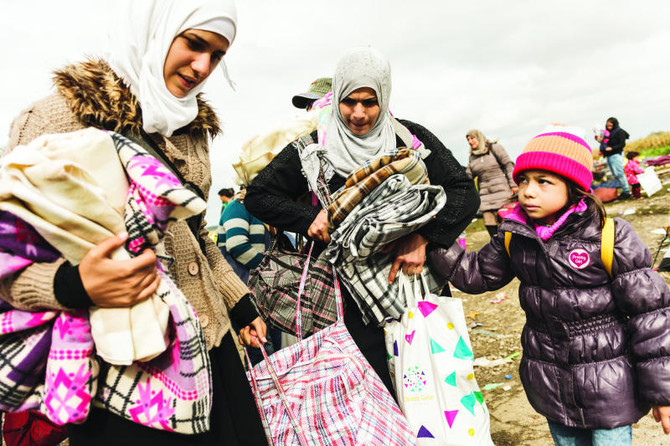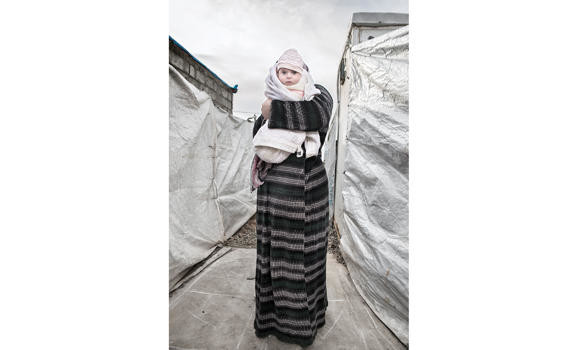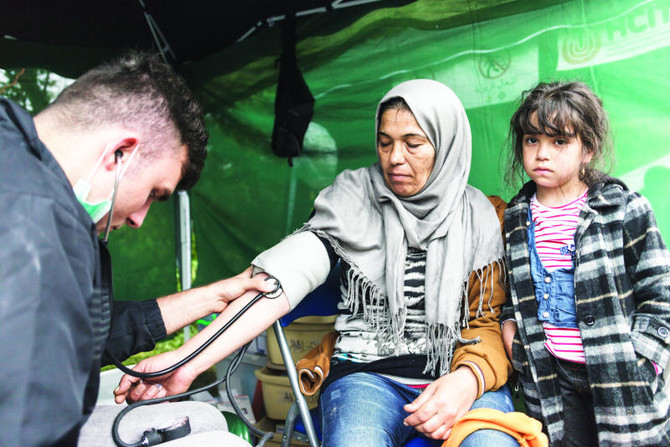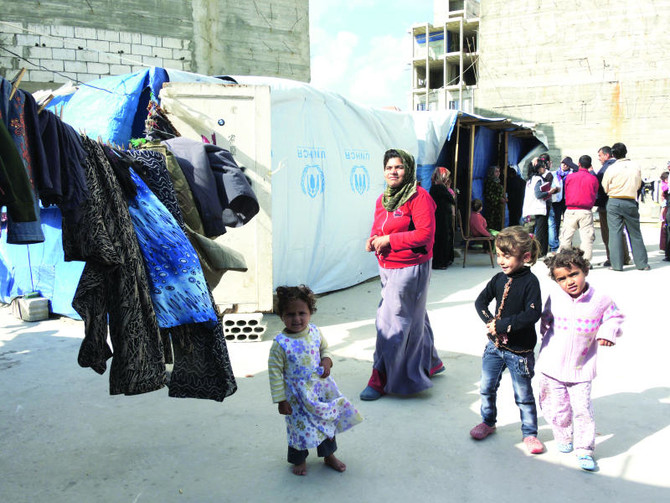Women remain acutely underrepresented in UN-brokered peace talks despite the fact that sixteen years ago their participation was recognized in a UN Security Council Resolution (1325) as being of vital importance.
For Haifa Fahoum Al-Kaylani, Founder Chair of the Arab International Women’s Forum, and Ibrahim Gambari, former Foreign Affairs Minister of Nigeria and UN Under-Secretary-General for Political Affairs, this is a truly lamentable state of affairs. Both serve on the Commission on Global Justice, Security & Governance whose report ‘Confronting the Crisis of Global Governance’ reveals gender inequality as a fundamental global governance challenge in conflict-affected environments, where, compared to men, women suffer harm differently and disproportionately.
They note that all too often women, especially in violent conflict and post-conflict settings, suffer serious physical and mental harm, lack access to critical services and struggle to achieve dignified livelihoods and exert decision-making power.
They point to research carried out by UNIFEM/UN Women revealing that, in fourteen cases since 2000, women’s participation in peace negotiation delegations averaged less than eight percent, and less than three percent of their signatories were women.
Today, only two of twenty-two UN Under-Secretaries-General are women, and in UN Missions, women make up less than one-third of the international civilian staff, 21 percent of senior professional levels, and only 18 percent of national staff. Moreover, the recent Global Study on the Implementation of United Nations Security Council Resolution 1325 found that only 54 countries have formulated National Action Plans for Resolution 1325.
In the UN Secretary General Ban Ki-moon’s 2014 report on Women, Peace and Security he expressed concerns about the plight of women. He wrote: “I am deeply troubled by continuing and emerging trends and patterns of abuse, violence and discrimination against women and girls in many conflict and post-conflict settings, often as deliberate campaigns against women’s rights. In Iraq and the Syrian Arab Republic, women have been directly targeted in the outbreak of violence, with reports of rape, forced marriage, forced prostitution, restrictions of movement, enforcement of dress codes and stoning of women for alleged adultery in areas controlled by militants from the Daesh. The escalation of violence in Iraq in 2014 includes the mass killing in Baghdad of women alleged to be sex workers and the targeting and mass abduction of minority women.
“In the Central African Republic and South Sudan, women have been disproportionately affected by mass displacement. In some areas of South Sudan, rates of female-headed households are close to 60 percent and women and girls face significant security risks, including in sites for the protection of civilians. In the eastern Democratic Republic of the Congo, there are continued concerns regarding the presence of armed groups, the increased number of internally displaced persons and refugees, who are mostly women and children, and continued incidents of sexual violence. In Afghanistan, the number of women and girls killed or injured increased by 61 percent in the first half of 2013, as compared with 2012, and targeted killings or attacks against women in public roles continued, including the killings of two high-ranking women police officers, Islam Bibi and Lt. Negar, in the southern province of Helmand. I call upon all parties to cease such acts immediately and upon relevant stakeholders to respond to all reports and ensure the physical security, safety, protection and enforcement of the rights of women and girls. The protection of civilians is a legal obligation. Members of security forces, local militias or other armed groups who have committed violations of international humanitarian or human rights law must be held to account.
“The immense human and financial cost of conflict is starkly visible in the situation of refugees, asylum seekers and internally displaced persons. The Global Trends report, produced annually by the Office of the United Nations High Commissioner for Refugees (UNHCR), shows that 51.2 million people were forcibly displaced at the end of 2013, 6 million more than the 45.2 million reported in 2012. The increase was driven mainly by the situation in the Syrian Arab Republic, which, by the end of 2013, had forced 2.5 million people to become refugees and left 6.5 million people internally displaced — most of whom are residing in urban and peri-urban areas rather than camps. In total, 56 percent of the world’s refugees originate from Afghanistan, Somalia and the Syrian Arab Republic alone. Major new displacements were also seen in Africa, notably in the Central African Republic and South Sudan. The data were gathered before the renewed conflict in Iraq and the intensification of violence between Israel and the State of Palestine, which resulted in massive new displacements. Increased displacement has also been reported in Ukraine. I call upon all actors to take immediate steps to ensure that forcibly displaced populations are protected from violence, humanitarian access is granted and responses are scaled up to deliver gender-responsive services.”
Today, we continue to witness the mass movement of families from war torn countries with many losing their lives in their attempts to find safety.
To ensure that women’s voices are heard and decision-makers made more accountable, particularly in fragile states, the Commission on Global Justice, Security & Governance proposes several innovations to advance a vision of “just security.”
First, strengthen the role of women in peace processes. Global and regional institutions should appoint women to prominent peacemaking roles. International actors that support peace processes should demand women’s inclusion in negotiating teams and as signatories to ensure that their experiences and priorities are represented.
Second, employ National Action Plans for Resolution 1325 as an effective tool of foreign policy. Incorporating such Plans into a country’s foreign policy can secure and sustain political will and resources — two critical components for ensuring that a Plan’s objectives are met and leaders held accountable.
Third, tackle the socio-economic factors that disadvantage women’s status in society. The Commission recognizes several such factors, including the lack of access to education, reproductive health services, and decent work opportunities in the formal economy.
Finally, the Commission strongly endorses the UN’s goal of empowering women to become national and world leaders in the 21st century. The Campaign to Elect a Woman UN Secretary General, organized by a group of female scholars and civil society leaders, is cited as an excellent example toward achieving this goal.
Current possible candidates to succeed Ban Ki-moon include UNESCO’s Director-General Irina Bokova, UNDP’s Administrator Helen Clark, and former Special Adviser to the UN Secretary-General Amina Mohammed. All possess high-level qualifications and proven leadership skills.
It is hoped that by adopting such measures, the formidable political, socio-cultural and economic obstacles that prevent the participation of women in peace efforts, whether as peacemakers or as citizens, can be overcome.
Women’s voices need to be heard in global peace talks
Women’s voices need to be heard in global peace talks

Are we all aliens? NASA’s returned asteroid samples hold the ingredients of life from a watery world
Are we all aliens? NASA’s returned asteroid samples hold the ingredients of life from a watery world

CAPE CANAVERAL, Florida: Asteroid samples fetched by NASA hold not only the pristine building blocks for life but also the salty remains of an ancient water world, scientists reported Wednesday.
The findings provide the strongest evidence yet that asteroids may have planted the seeds of life on Earth and that these ingredients were mingling with water almost right from the start.
“That’s the kind of environment that could have been essential to the steps that lead from elements to life,” said the Smithsonian Institution’s Tim McCoy, one of the lead study authors.
NASA’s Osiris-Rex spacecraft returned 122 grams (4 ounces) of dust and pebbles from the near-Earth asteroid Bennu, delivering the sample canister to the Utah desert in 2023 before swooping off after another space rock. It remains the biggest cosmic haul from beyond the moon. The two previous asteroid sample missions, by Japan, yielded considerably less material.
Small amounts of Bennu’s precious black grains — leftovers from the solar system’s formation 4.5 billion years ago — were doled out to the two separate research teams whose studies appeared in the journals Nature and Nature Astronomy. But it was more than enough to tease out the sodium-rich minerals and confirm the presence of amino acids, nitrogen in the form of ammonia and even parts of the genetic code.
Some if not all of the delicate salts found at Bennu — similar to what’s in the dry lakebeds of California’s Mojave Desert and Africa’s Sahara — would be stripped away if present in falling meteorites.
“This discovery was only possible by analyzing samples that were collected directly from the asteroid then carefully preserved back on Earth,” the Institute of Science Tokyo’s Yasuhito Sekine, who was not involved in the studies, said in an accompanying editorial.
Combining the ingredients of life with an environment of sodium-rich salt water, or brines, “that’s really the pathway to life,” said McCoy, the National Museum of Natural History’s curator of meteorites. “These processes probably occurred much earlier and were much more widespread than we had thought before.”
NASA’s Daniel Glavin said one of the biggest surprises was the relatively high abundance of nitrogen, including ammonia. While all of the organic molecules found in the Bennu samples have been identified before in meteorites, Glavin said the ones from Bennu are valid — “real extraterrestrial organic material formed in space and not a result of contamination from Earth.”
Bennu — a rubble pile just one-third of a mile (one-half of a kilometer) across — was originally part of a much larger asteroid that got clobbered by other space rocks. The latest results suggest this parent body had an extensive underground network of lakes or even oceans, and that the water evaporated away, leaving behind the salty clues.
Sixty labs around the world are analyzing bits of Bennu as part of initial studies, said the University of Arizona’s Dante Lauretta, the mission’s chief scientist who took part in both studies.
Most of the $1 billion mission’s cache has been set aside for future analysis. Scientists stress more testing is needed to better understand the Bennu samples, as well as more asteroid and comet sample returns. China plans to launch an asteroid sample return mission this year.
Many are pushing for a mission to collect rocks and dirt from the potentially waterlogged dwarf planet Ceres in the main asteroid belt. Jupiter’s moon Europa and Saturn’s moon Enceladus also beckon as enticing water worlds. Meanwhile, NASA has core samples awaiting pickup at Mars, but their delivery is on hold while the space agency studies the quickest and cheapest way to get them here.
“Are we alone?” McCoy said. “That’s one of the questions we’re trying to answer.”
Newly spotted asteroid has a tiny chance of hitting Earth in 2032

CAPE CANAVERAL, Florida: A newly discovered asteroid has a tiny chance of smacking Earth in 2032, space agency officials said Wednesday.
Scientists put the odds of a strike at slightly more than 1 percent.
“We are not worried at all, because of this 99 percent chance it will miss,” said Paul Chodas, director of NASA’s Center for Near Earth Object Studies. “But it deserves attention.”
First spotted last month by a telescope in Chile, the near-Earth asteroid — designated 2024 YR4 — is estimated to be 130 to 330 feet (40 to 100 meters) across.
Scientists are keeping close watch on the space rock, which is currently heading away from Earth. As the asteroid’s path around the sun becomes better understood, Chodas and others said there’s a good chance the risk to Earth could drop to zero.
The asteroid will gradually fade from view over the next few months, according to NASA and the European Space Agency. Until then, some of the world’s most powerful telescopes will keep monitoring it to better determine its size and path. Once out of sight, it won’t be visible until it passes our way again in 2028.
The asteroid came closest to Earth on Christmas Day — passing within roughly 500,000 miles (800,000 kilometers) of Earth, about twice the distance of the moon. It was discovered two days later.
Chodas said scientists are poring over sky surveys from 2016, when predictions show the asteroid also ventured close.
If scientists can find the space rock in images from then, they should be able to determine whether it will hit or miss the planet, he told The Associated Press. “If we don’t find that detection, the impact probability will just move slowly as we add more observations,” he said.
Earth gets clobbered by an asteroid this size every few thousand years, according to ESA, with the potential for severe damage. That’s why this one now tops ESA’s asteroid risk list.
The potential impact would occur on Dec. 22, 2032. It’s much too soon to know where it might land if it did hit Earth.
The good news, according to NASA, is that for now, no other known large asteroids have an impact probability above 1 percent.
Coffee prices surge to record highs above $3.60 per lb

- Dealers said 70 percent-80 percent of Brazil’s current arabica harvest has been sold and new trades are slow
- Brazil produces nearly half the world’s arabica beans, a high-end variety typically used in roast and ground blends
NEW YORK: Global arabica coffee prices hit record highs above $3.60 per lb on Wednesday as Brazil, by far the world’s largest producer, has few beans left to sell and as worries over its upcoming harvest persist.
Dealers said 70 percent-80 percent of Brazil’s current arabica harvest has been sold and new trades are slow. Brazil produces nearly half the world’s arabica beans, a high-end variety typically used in roast and ground blends.
The country’s recent weather has been more favorable after a severe drought last year. Still, the upcoming crop will be 4.4 percent smaller than the previous, according to Brazilian food supply agency Conab.
“Global coffee supplies remain limited. Vietnam is progressing slowly with sales of its robusta crop. The arabica harvested in Central America and Colombia is taking longer to get to the market, and Brazilian farmers don’t show much interest in selling more,” said broker HedgePoint Global Markets on Wednesday.
Arabica coffee futures on the ICE exchange, a contract used globally to price physical coffee trades, hit a record high of $3.6945 per lb earlier, bringing gains for the year up nearly 15 percent. The contract later closed up 2.5 percent at $3.6655 per lb.
Robusta coffee, a generally cheaper variety used mostly to make instant coffee, rose 0.9 percent at $5,609 a metric ton.
Coffee exports from India, the world’s fifth largest robusta producer, are expected to decline more than 10 percent in 2025 due to lower production and reduced carry-forward stocks from last season’s crop.
Dealers said farmers in both India and Vietnam, the world’s top robusta producer, are holding back sales in anticipation of further price gains and that in Brazil, some 80-90 percent of the current harvest has been sold.
Broker Sucden said in a report that Brazilian farmers are also prioritizing local sales over dollar-priced exports even though the latter fetch more money as their financial position has improved significantly over the past two years.
It added the country’s current buffer stocks have eroded to an estimated 500,000 bags versus some 8 million bags traditionally, meaning any additional weather disruptions could have an outsized impact on global coffee prices.
Sucden sees the global coffee market recording a fourth successive deficit this season.
In other soft commodities traded, raw sugar rose 1.1 percent at 19.45 cents per lb, rebounding strongly from last week’s five-month low, while white sugar gained 2.2 percent at $522.90 a ton.
New York cocoa futures rose 3.3 percent to $11,745 a ton, while London cocoa gained 1.6 percent to 9,138 pounds per ton.
‘Monte Cristo’, ‘Emilia Perez’ front-runners at France’s Cesar film awards

- “The Count of Monte Cristo” topped the nominations released Wednesday for the Cesars, France’s version of the Oscars, followed closely by international awards season front-runner “Emilia Perez“
PARIS: Home-made hit “The Count of Monte Cristo” topped the nominations released Wednesday for the Cesars, France’s version of the Oscars, followed closely by international awards season front-runner “Emilia Perez.”
“The Count of Monte Cristo,” a big-budget French adaptation of Alexandre Dumas’s epic novel, was the second most watched film in French cinemas last year and leads the Cesars nominations with 14.
Lead actor Pierre Niney is the front-runner in the best actor category, but faces competition from Francois Civil who starred in the surprise French comedy hit of the year, “Un P’tit Truc en Plus” (“A Little Something Extra“).
The film about a father and son who go to work in a holiday camp for people with disabilities topped the French 2024 box office and picked up 13 nominations.
“Emilia Perez,” directed by Frenchman Jacques Audiard and the most-nominated film for the Oscars, was picked in 12 categories for the Cesars, including best film and best director.
The surreal musical odyssey about a narco boss who transitions to life as a woman shattered the record for the most Academy Award nominations for a non-English-language film last week, with 13 Oscar nominations.
It was also the second-most nominated film for Britain’s BAFTA awards, according to the shortlist unveiled on January 15, behind Vatican thriller “Conclave.”
The Cesars will be handed out in Paris on February 28 at a ceremony hosted by Jean-Pascal Zadi, who starred in a hit 2021 satire about racial politics called “Tout Simplement Noir” (“Simply Black“).
This edition will mark the 50th year of the Cesars, which like the Oscars are frequently embroiled in the political issues of the day.
“L’Histoire de Souleymane” (“Souleymane’s Story“), an arthouse production that recounts the struggles of an undocumented food delivery cyclist in Paris, emerged as a strong awards contender with four nominations including best film and best director.
It comes at a time of rising support for far-right political parties in France and follows a recent tightening of immigration rules by hard-line Interior Minister Bruno Retailleau to make it more difficult for foreigners to gain work documents.
The star of the film, Abou Sangare, was an undocumented migrant from Guinea with no previous acting experience when he was chosen at a casting call by director Boris Lojkine.
The 23-year-old was nominated for a Cesar in the breakthrough male actor category, while co-star Nina Meurisse was nominated as best actress.
Sangare, who was the subject of a deportation order, only recently obtained a work permit to stay in France legally as a mechanic.
He told the Liberation newspaper this month that he intended to take up a job in a garage, rather than pursue a career in film.
“There might be offers but I’m a mechanic, that’s my trade,” he said.
The winners of the Cesars are picked by the 4,951 members of the Cesars academy.
The Year of the Snake is underway with the Lunar New Year in Asia and around the world

- The holiday is a major festival celebrated by diaspora communities around the world
- The snake is one of 12 animals in the Chinese zodiac and follows the just-ended Year of the Dragon
BEIJING: Lunar New Year festivals and prayers marked the start of the Year of the Snake around Asia and farther afield on Wednesday — including in Moscow.
Hundreds of people lined up in the hours before midnight at the Wong Tai Sin Taoist temple in Hong Kong in a bid to be among the first to put incense sticks in the stands in front of the temple’s main hall.
“I wish my family will be blessed. I hope my business will run well. I pray for my country and wish people peace. I hope this coming year is a better year,” said Ming So, who visits the temple annually on the eve of the Lunar New Year.
The holiday — known as the Spring Festival in China, Tet in Vietnam and Seollal in Korea — is a major festival celebrated by diaspora communities around the world. The snake, one of 12 animals in the Chinese zodiac, follows the just-ended Year of the Dragon.
The pop-pop-pop of firecrackers greeted the new year outside Guan Di temple in Malaysia’s capital, Kuala Lumpur, followed by lion dances to the rhythmic beat of drums and small cymbals.
Ethnic Chinese holding incense sticks in front of them bowed several times inside the temple before sticking the incense into elaborate gold-colored pots, the smoke rising from the burning tips.
Many Chinese who work in bigger cities return home during the eight-day national holiday in what is described as the world’s biggest annual movement of humanity. Beijing, China’s capital, has turned into a bit of a ghost town, with many shops closed and normally crowded roads and subways emptied out.
Traditionally, Chinese have a family dinner at home on New Year’s Eve and visit “temple fairs” on the Lunar New Year to watch performances and buy snacks, toys and other trinkets from booths.
Many Chinese take advantage of the extended holiday to travel both in the country and abroad. Ctrip, an online booking agency that operates Trip.com, said the most popular overseas destinations this year are Japan, Thailand, Hong Kong, Malaysia, Singapore, Australia, the United States, South Korea, Macao and Vietnam.
Russians cheered, waved and took smartphone photos of a colorful procession with drummers, costumed dancers and large dragon and snake figures held aloft that kicked off a 10-day Lunar New Year festival in Moscow on Tuesday night.
The Chinese and Russian governments have deepened ties since 2022, in part to push back against what they see as US dominance of the world order.
Visitors shouted “Happy New Year” in Russian and expressed delight at being able to experience Chinese food and culture in Moscow, including folk performances and booths selling snacks and artwork.

























